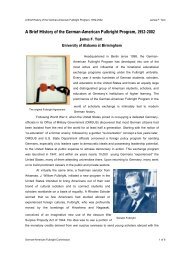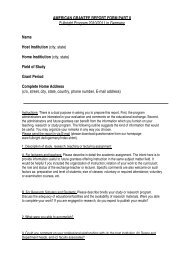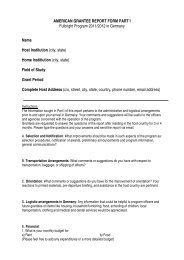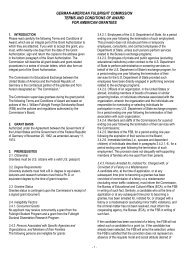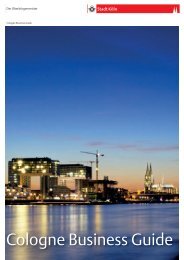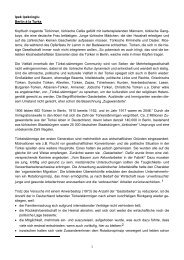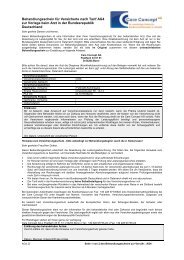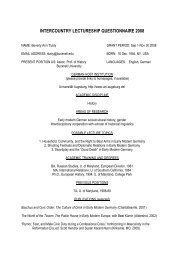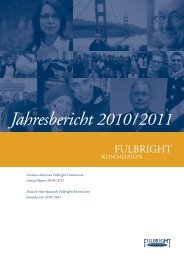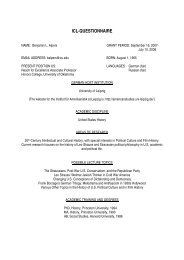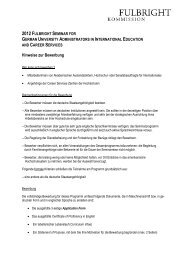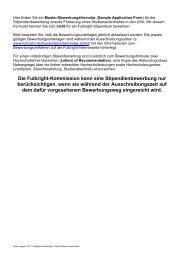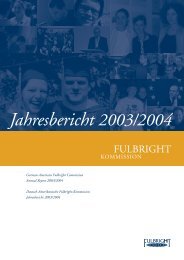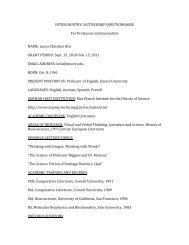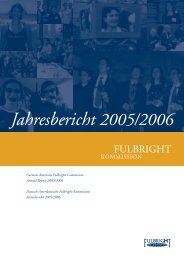The First Class of Fulbrighters - Fulbright-Kommission
The First Class of Fulbrighters - Fulbright-Kommission
The First Class of Fulbrighters - Fulbright-Kommission
You also want an ePaper? Increase the reach of your titles
YUMPU automatically turns print PDFs into web optimized ePapers that Google loves.
Aus dem Leben eines<br />
<strong><strong>Fulbright</strong>ers</strong><br />
by Reinhard Wittke<br />
THE FULBRIGHT GRANT TO MUNICH, Germany<br />
was without question a most significant career experience. It<br />
was a turning point in my career, providing research for the<br />
completion <strong>of</strong> the dissertation, spice and enhancement for a<br />
teaching career, the catalyst for the Europe international<br />
travel study program at Eastern Michigan University, which<br />
I later introduced, as well as an appreciation and understanding<br />
<strong>of</strong> not only Germany and Germans, but also<br />
Europe in general.<br />
<strong>The</strong> grant was also extra special to me and my wife,<br />
Bert. It made possible a return to the land <strong>of</strong> our birth. Our<br />
families emigrated to the States in 1926 when I was five and<br />
my Bert was four.<br />
Meeting with the 1953ers and attending the seminars at<br />
the 50th anniversary program in Washington D.C. in October<br />
2002 revived many <strong>of</strong> my memories for this account. My<br />
Tagebuch and documents provided the details.<br />
How different Germany was for the first <strong><strong>Fulbright</strong>ers</strong> <strong>of</strong><br />
1953 and the years immediately following than for the subsequent<br />
and more recent grantees. Perhaps even more so for<br />
me and my wife. I went as a student grantee, although I<br />
already had experience as a teaching assistant and college<br />
instructor. My wife and I were no longer “students,” and we<br />
were probably older than the average grantee and had lived<br />
faculty lives.<br />
<strong>The</strong> first <strong><strong>Fulbright</strong>ers</strong> arrived in Germany just eight<br />
years after the conclusion <strong>of</strong> World War II. Conditions then<br />
contrast starkly with conditions now. <strong>The</strong> ravages <strong>of</strong> WWII<br />
were still very evident. Cities showed the destruction <strong>of</strong><br />
mass bombings. Germany was divided into zones and Berlin<br />
into sectors. <strong>The</strong> Wirtschaftswunder 1 was in its infancy, the<br />
infrastructure just recently in place.<br />
Indeed, it was different from the very beginning. Today<br />
one can travel to Germany in a day. In 1953 we boarded the<br />
S.S. Independence on September 4, arrived in the port <strong>of</strong><br />
Genoa, Italy, on September 13, and then took the night<br />
train from Genoa to Bad Honnef am Rhein, our orientation<br />
destination, arriving on September 14.<br />
THE ORIENTATION PROGRAM was perhaps also<br />
different. Accommodations were scarce and the <strong><strong>Fulbright</strong>ers</strong><br />
numbered about 190. Bert and I were to be housed in the<br />
Bürgerhaus Weis, however, it was not available until two<br />
days after we arrived. In the meanwhile, we were placed in a<br />
very nice private home in a room with a view <strong>of</strong> the<br />
Drachenfels 2 and a very friendly and sympathetic landlady,<br />
but with no hot water or bathing facilities. After two days<br />
we transferred to the Bürgerhaus Weis, a small, pleasant,<br />
homey hotel-restaurant. It was splendid. We were wonderfully<br />
received and in our seventeen-day stay we were made<br />
to feel like family, even by<br />
the dachshund Etzel.<br />
<strong>The</strong>re were entertaining<br />
evenings at the Stammtisch<br />
and we were escorted to<br />
numerous sites in the surrounding<br />
area.<br />
<strong>The</strong> orientation program<br />
lasted three weeks.<br />
<strong>The</strong>re was a daily program<br />
<strong>of</strong> lectures and orientation<br />
classes. <strong>The</strong>re were also<br />
excursions that took us to<br />
the Bayer Fabrik in Leverkusen,<br />
and a drive<br />
through the beautiful<br />
valleys <strong>of</strong> the Ahr and the<br />
Mosel, culminating in a<br />
wonderful dinner reception<br />
and wine party in<br />
Cochem sponsored by the<br />
Bürgermeister.<br />
Our farewell to Bad<br />
Honnef, on October 2, was<br />
celebrated by a <strong>Fulbright</strong><br />
sponsored dance and an<br />
intimate party given us by<br />
the Bürgerhaus Weis.<br />
Now quo vadis?<br />
Munich, or? Since the winter<br />
semester did not begin<br />
until late October we<br />
decided to visit Bert’s relatives<br />
in Stuttgart and the<br />
Allgäu. In Stuttgart we<br />
became the owners <strong>of</strong> an<br />
Opel Kapitän, an auto left<br />
over from a prior visit by<br />
Bert’s family. <strong>The</strong> vehicle<br />
would be both a blessing<br />
and a curse. We made<br />
every effort to sell it, and<br />
finally succeeded in April<br />
1954. However, for the<br />
time being we had easier,<br />
immediate, and comfortable<br />
transportation. That is<br />
how we arrived in the Allgäu<br />
to visit our relatives.<br />
Reinhard Wittke was born in Drossen,<br />
Germany (now Osna Lubice) in 1921.<br />
His family emigrated to the United<br />
States in 1926 and he was naturalized<br />
in 1935. In 1947 he married<br />
Berthilda Metzger and they had a<br />
daughter Sigrid. Wittke studied at the<br />
University <strong>of</strong> Michigan where he<br />
received his A.B. 1943, M.A. 1945,<br />
and Ph.D. in medieval history, 1959.<br />
In between he spent 1953 in Munich<br />
on a <strong>Fulbright</strong> grant. After earning<br />
his Ph.D., he taught public school in<br />
Trenton, MI, 1943-45 and Rogers<br />
City, MI, 1945 before moving on to<br />
Mankato State College, 1949-51, and<br />
Eastern Michigan University, 1956-<br />
90. Wittle conducted the European<br />
Study Program at Eastern Michigan<br />
University, 1960-90 and in 1993.<br />
He has been honored with the Senior<br />
teaching award (1981), the Higher<br />
Education Award (1989), and the<br />
Eastern Michigan University Board <strong>of</strong><br />
Regents University Service Award<br />
(1989) and is a member <strong>of</strong> the Michigan<br />
Association <strong>of</strong> Governing Boards.



